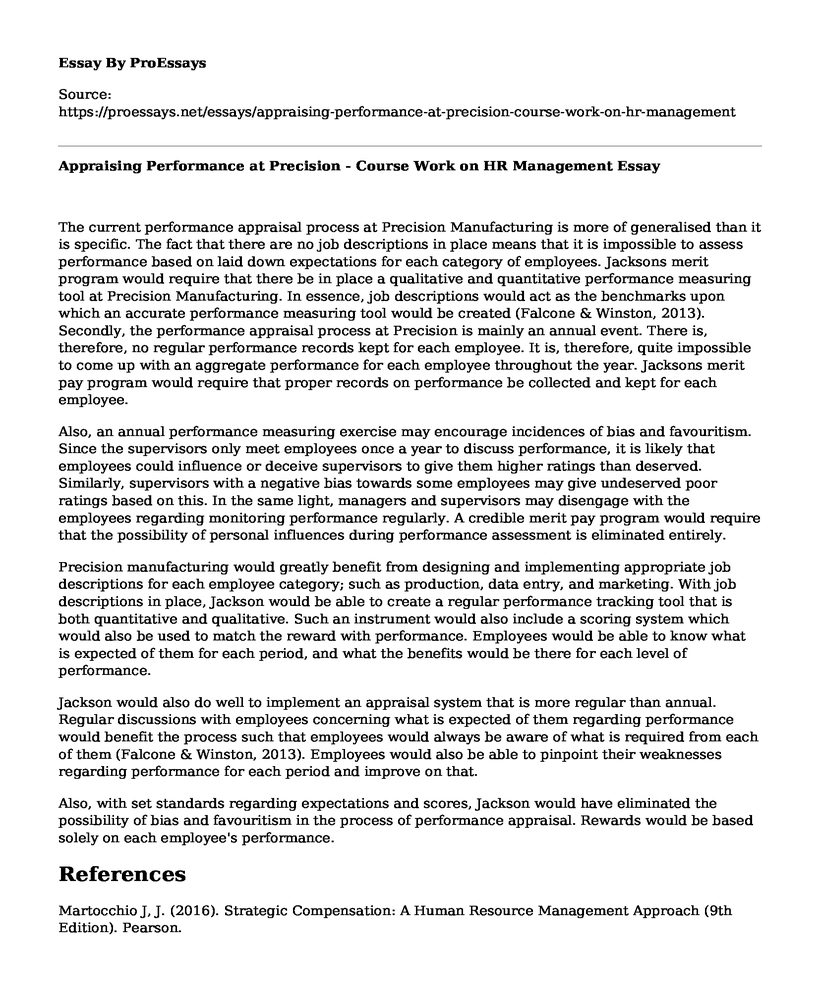The current performance appraisal process at Precision Manufacturing is more of generalised than it is specific. The fact that there are no job descriptions in place means that it is impossible to assess performance based on laid down expectations for each category of employees. Jacksons merit program would require that there be in place a qualitative and quantitative performance measuring tool at Precision Manufacturing. In essence, job descriptions would act as the benchmarks upon which an accurate performance measuring tool would be created (Falcone & Winston, 2013). Secondly, the performance appraisal process at Precision is mainly an annual event. There is, therefore, no regular performance records kept for each employee. It is, therefore, quite impossible to come up with an aggregate performance for each employee throughout the year. Jacksons merit pay program would require that proper records on performance be collected and kept for each employee.
Also, an annual performance measuring exercise may encourage incidences of bias and favouritism. Since the supervisors only meet employees once a year to discuss performance, it is likely that employees could influence or deceive supervisors to give them higher ratings than deserved. Similarly, supervisors with a negative bias towards some employees may give undeserved poor ratings based on this. In the same light, managers and supervisors may disengage with the employees regarding monitoring performance regularly. A credible merit pay program would require that the possibility of personal influences during performance assessment is eliminated entirely.
Precision manufacturing would greatly benefit from designing and implementing appropriate job descriptions for each employee category; such as production, data entry, and marketing. With job descriptions in place, Jackson would be able to create a regular performance tracking tool that is both quantitative and qualitative. Such an instrument would also include a scoring system which would also be used to match the reward with performance. Employees would be able to know what is expected of them for each period, and what the benefits would be there for each level of performance.
Jackson would also do well to implement an appraisal system that is more regular than annual. Regular discussions with employees concerning what is expected of them regarding performance would benefit the process such that employees would always be aware of what is required from each of them (Falcone & Winston, 2013). Employees would also be able to pinpoint their weaknesses regarding performance for each period and improve on that.
Also, with set standards regarding expectations and scores, Jackson would have eliminated the possibility of bias and favouritism in the process of performance appraisal. Rewards would be based solely on each employee's performance.
References
Martocchio J, J. (2016). Strategic Compensation: A Human Resource Management Approach (9th Edition). Pearson.
Falcone, P., Winston, T. (2013). The Performance Appraisal Toolkit: Redesigning Your Performance Review Template to Drive Individual and Organizational Change. New York: AMACOM Div American Mgmt Assn
Cite this page
Appraising Performance at Precision - Course Work on HR Management. (2021, Jun 28). Retrieved from https://proessays.net/essays/appraising-performance-at-precision-course-work-on-hr-management
If you are the original author of this essay and no longer wish to have it published on the ProEssays website, please click below to request its removal:
- Research Paper Example on Project Management
- Verizon Inc. Analysis Paper Example
- Essay Sample on Leadership Behaviours
- Essay Sample on HRM: Creating an Ethical Workplace for Optimal Performance
- Essay Example on Interprofessional Collaboration: Enhancing Healthcare Outcomes
- Essay on Regulating Social Media Usage in Professional Settings: Balancing Performance & Behaviour
- Sarah Kim: Unfair Treatment by Boss Despite Excellent Performance - Paper Sample







